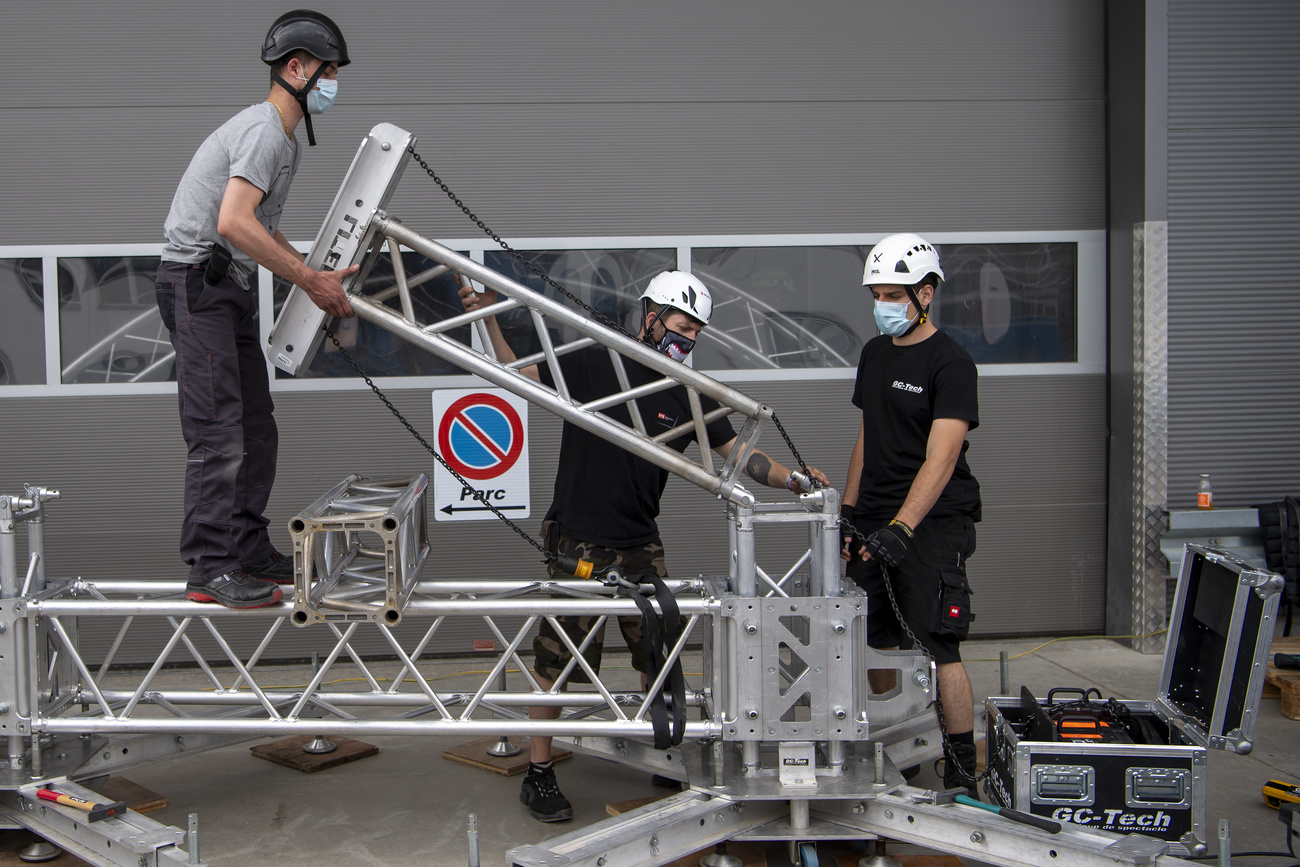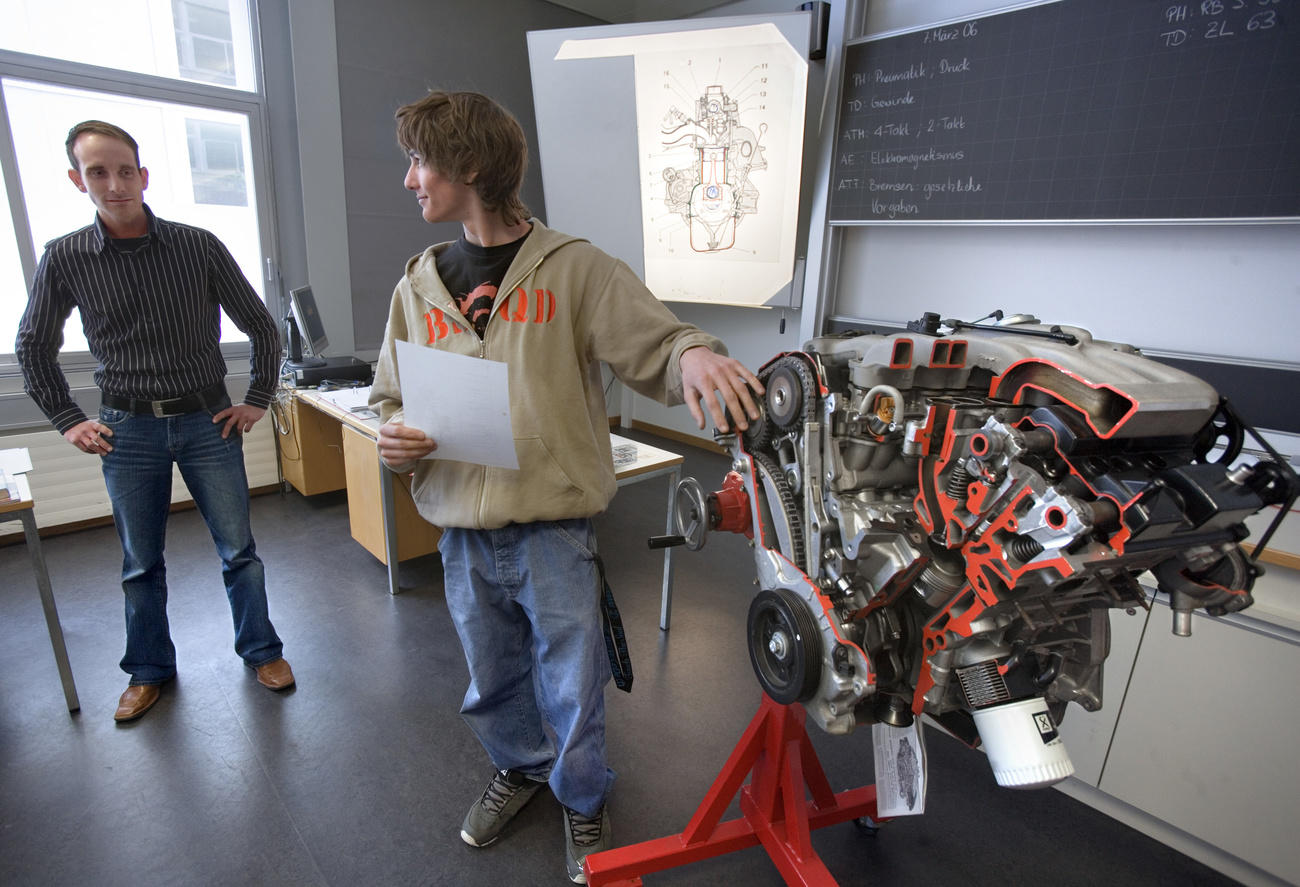How have Swiss apprentices fared during the pandemic?

Thousands of teenagers started apprenticeships in Switzerland this week. The latest statistics show that 90% of training places have been filled, countering fears of a ‘corona shock’ – for now.
Around two-thirds of young people opt for vocational training in Switzerland versus attending university. School-leavers usually sign contracts for apprenticeships that start in the first week of August (which combine on-the-job-training with vocational school).
However, educators have expressed concern that young people might fail to find a training place due to the lockdown in March and April this year and the economic impact of the coronavirus. In May the government set up a taskforceExternal link to tackle the issue.
But according to the Apprenticeship Pulse research projectExternal link, the situation is looking up. (The project is a cooperation between the largest apprenticeship jobs platform Yousty.chExternal link and the Chair of Education Systems at Switzerland’s Federal Institute of Technology ETH Zurich).External link
Results published on Thursday show that by July, 90% of places for August 2020 had been filled.
“The situation is not as bad as expected, which is very pleasing,” Yousty.ch’s Domenica Mauch told swissinfo.ch by email. “But we should remain cautious, we must carefully observe the long-term effect of Covid-19 on the economy and vocational training. That’s why we will continue the survey until at least next April.”
There are several reasons for the better-than-expected results, Mauch says.
“One is that the Swiss economy is clearly supporting the dual training system and promotion of the young workforce… and there is a lot being done by the government’s taskforce and from the industry associations to support companies.”
Efforts by the taskforce include working with the cantons to set up “last-minute apprenticeship places platforms” for open positions and extending the deadline for apprenticeship contract signing until autumn.

More
Small companies, vocational training help Swiss weather digital disruption
Regional differences
The Apprenticeship Pulse results are similar to those from the government taskforce which reported earlier this month that 55,000 apprenticeship training contracts had been signed by the end of June – just 3% fewer than in June 2019.
But there are regional differences. Swiss public television SRF reportedExternal link in late July that the number of signed contracts was down by 17% on 2019 in the French-speaking canton of Vaud, with canton Geneva reporting a 24% drop on last year.
The reason? Timing. In the German-speaking part of Switzerland the application process for new apprenticeships starts the previous August, so many contracts are signed early. But in the French and Italian-speaking part of the country, the process only starts in spring – exactly during this year’s nationwide coronavirus lockdown.
Attitudes towards apprenticeships also differ regionally, perhaps contributing to the gulf in the number of signed contracts.
“Apprenticeships have a kind of social stigma among the academic elite in the western part of Switzerland: it’s something for the less able students. In the German-speaking part, apprenticeships have a high social prestige, also in business,” economist Rudolf Strahm told Swiss Public Broadcaster SRF.
Help is at hand in some areas. Canton Geneva is currently offering training bonuses to companies that hire apprentices and has extended the contract signing deadline until November. The Italian-speaking canton of Ticino recently announced similar measures.
Perspectives
But what of those young people in the midst of their two-to-four-year apprenticeships? The coronavirus lockdown saw many companies close down or scale back operations, including vocational training. While just 64% of apprentices were able to train in April, the Apprenticeship Pulse survey found that by July, 91% of apprentices were back working in their training companies under government-recommended hygiene measures. Only 0.3% of current apprentices are not receiving any kind of on-the-job training due to company closures, it noted.
Those coming to the end of their training, who have already faced the difficulty of finishing the qualifications under the pandemic situation, are now looking for their first jobs in an economy suffering its worst downturn in decades. Some will stay on at the companies they trained with, but this number is expected to fall by 16%, the survey found.

More
In space exploration, Switzerland punches above its weight

In compliance with the JTI standards
More: SWI swissinfo.ch certified by the Journalism Trust Initiative





You can find an overview of ongoing debates with our journalists here. Please join us!
If you want to start a conversation about a topic raised in this article or want to report factual errors, email us at english@swissinfo.ch.